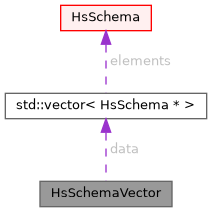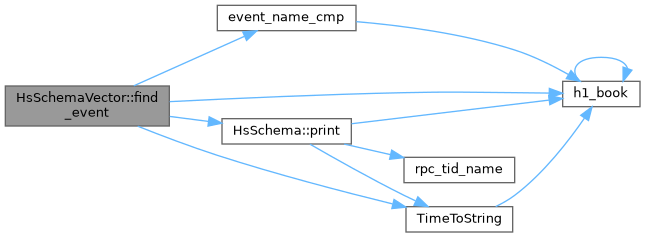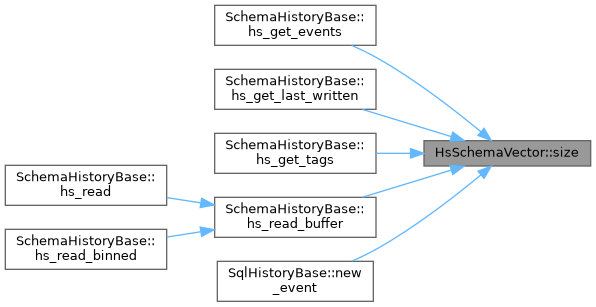Loading...
Searching...
No Matches
HsSchemaVector Class Reference
Collaboration diagram for HsSchemaVector:

Public Member Functions | |
| ~HsSchemaVector () | |
| HsSchema * | operator[] (int index) const |
| size_t | size () const |
| void | add (HsSchema *s) |
| void | clear () |
| void | print (bool print_tags=true) const |
| HsSchema * | find_event (const char *event_name, const time_t timestamp, int debug=0) |
Protected Attributes | |
| std::vector< HsSchema * > | fData |
Detailed Description
Definition at line 448 of file history_schema.cxx.
Constructor & Destructor Documentation
◆ ~HsSchemaVector()
|
inline |
Member Function Documentation
◆ add()
| void HsSchemaVector::add | ( | HsSchema * | s | ) |
Definition at line 503 of file history_schema.cxx.
504{
505 // schema list "data" is sorted by decreasing "fTimeFrom", newest schema first
506
507 //printf("add: %s..%s %s\n", TimeToString(s->fTimeFrom).c_str(), TimeToString(s->fTimeTo).c_str(), s->fEventName.c_str());
508
509 bool added = false;
510
514 // duplicate schema, keep the last one added (for file schema it is the newer file)
515 s->fTimeTo = (*it)->fTimeTo;
516 delete (*it);
517 (*it) = s;
518 return;
519 }
520 }
521
523 fData.insert(it, s);
524 added = true;
525 break;
526 }
527 }
528
529 if (!added) {
530 fData.push_back(s);
531 }
532
533 //time_t oldest_time_from = fData.back()->fTimeFrom;
534
535 time_t time_to = 0;
536
539 (*it)->fTimeTo = time_to;
540 time_to = (*it)->fTimeFrom;
541
542 //printf("vvv: %s..%s %s\n", TimeToString((*it)->fTimeFrom-oldest_time_from).c_str(), TimeToString((*it)->fTimeTo-oldest_time_from).c_str(), (*it)->fEventName.c_str());
543 }
544 }
545}
static int event_name_cmp(const std::string &e1, const char *e2)
Definition history_schema.cxx:218
Here is the call graph for this function:

Here is the caller graph for this function:

◆ clear()
|
inline |
◆ find_event()
| HsSchema * HsSchemaVector::find_event | ( | const char * | event_name, |
| const time_t | timestamp, | ||
| int | debug = 0 |
||
| ) |
Definition at line 547 of file history_schema.cxx.
548{
549 HsSchema* ss = NULL;
550
553 int found = 0;
557 if (event_name)
559 continue;
560 s->print();
561 found++;
562 }
563 printf("find_event: Found %d schemas for event %s\n", found, event_name);
564
565 //if (found == 0)
566 // abort();
567 }
568
571
572 // wrong event
573 if (event_name)
575 continue;
576
577 // schema is from after the time we are looking for
579 continue;
580
581 if (!ss)
582 ss = s;
583
584 // remember the newest schema
586 ss = s;
587 }
588
589 // try to find
592
593 // wrong event
594 if (event_name)
596 continue;
597
598 // schema is from after the time we are looking for
600 continue;
601
602 if (!ss)
603 ss = s;
604
605 // remember the newest schema
607 ss = s;
608 }
609
611 if (ss) {
613 ss->print();
614 } else {
616 }
617 }
618
619 return ss;
620}
Definition history_schema.cxx:403
Here is the call graph for this function:

Here is the caller graph for this function:

◆ operator[]()
|
inline |
Definition at line 458 of file history_schema.cxx.
◆ print()
|
inline |
Definition at line 477 of file history_schema.cxx.
477 {
480 }
Here is the call graph for this function:

Here is the caller graph for this function:

◆ size()
|
inline |
Member Data Documentation
◆ fData
|
protected |
Definition at line 451 of file history_schema.cxx.
The documentation for this class was generated from the following file:


